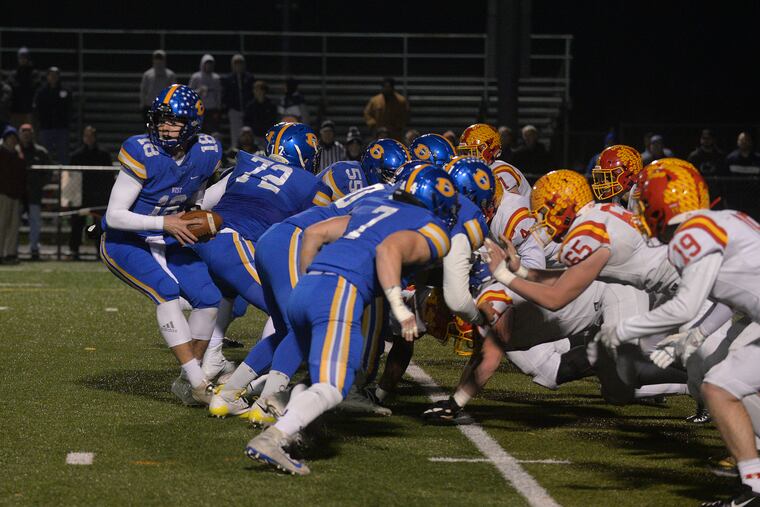Pennsylvania fall high school sports in serious jeopardy after Gov. Wolf recommends no competition until 2021
The Pennsylvania Interscholastic Athletic Association, which oversees high school sports in the commonwealth, expressed "tremendous disappointment" in the governor's recommendation.

The already uncertain future of fall sports for Pennsylvania high schools was thrown in serious doubt Thursday when Gov. Tom Wolf recommended that athletic competition not resume until 2021 because of concerns about the coronavirus.
The administration followed Wolf’s morning comments by issuing a “strong recommendation” jointly from the Pennsylvania Department of Health and Pennsylvania Department of Education that all K-12 school and recreational youth sports be postponed until at least Jan. 1.
The administration made clear that the guidance was a recommendation and “not an order or mandate” and noted that, like return-to-school plans, “school administrators and school boards should make decisions on sports.”
The Pennsylvania Interscholastic Athletic Association, which oversees high school sports in the commonwealth, said it was “tremendously disappointed” with Wolf’s recommendation. The PIAA said its board of directors would meet Friday afternoon to review the situation.
“Today, Governor Wolf issue a statement of strongly recommending no interscholastic and recreational sports until January 1,” the PIAA said in a statement. “We are tremendously disappointed in this decision. Our member schools have worked diligently to develop health and safety plans to allow students the safe return to interscholastic athletics.”
The PIAA added that its board of directors would issue an updated statement on Friday.
Highlights of the Wolf administration’s recommendation to “pause youth sports until Jan. 1, 2021″ include these points:
-- Applies to team and individual, school and non-school recreational sports.
-- Includes competitions, scrimmages and intramural play.
-- Teams can continue conditioning, drills and other training activities on an individual basis.
-- Does not apply to collegiate or professional sports.
-- Gathering limits remain unchanged, with no more than 25 persons indoors and 250 outdoors.
In recent days, the Philadelphia Catholic League, Inter-Ac League, Ches-Mont League, and Suburban One League have announced plans to delay the start of fall sports out of concerns about the further spread of COVID-19.
But Wolf’s recommendation and the guidance issued by the departments of health and education put the possibility of any competition this fall in sports such as football, soccer, field hockey, and cross-country in jeopardy.
“Anytime we get together for any reason, that’s a problem because it makes it easier for the virus to spread,” Wolf said. “So the guidance from us, the recommendation is that we don’t do sports until January 1.”
The possibility of a fall without sports likely was an alarming scenario for many players, coaches and parents.
“I think it’s a mistake,” Archbishop Wood football coach Matt Walp said of postponing fall sports. “What nobody seems to be considering is the mental health of these young people.
“If we shut things down and don’t try to learn how to live with this, we’re looking at a major impact on this younger generation of students who rely on athletics and other extracurricular activities as their conduit to life in general.”
Father Judge athletic director Jake Serfass, the chairman of the Catholic League, said Wolf’s recommendation “hits you in the gut a little bit.”
Serfass said PCL officials are awaiting an announcement from the PIAA, with the suspicion that high school sports will be shut down until the new year at the earliest.
“It’s been so difficult trying to figure this out, like trying to fly a plane while you are building it,” Serfass said.
Philadelphia school district athletic director James Lynch said the Public League has suspended operations, pending an official decision from district administrators.
Reacting to the governor’s recommendations, Philadelphia Health Commissioner Thomas Farley said the call to delay youth sports until Jan. 1 was “a wise move.” He also expressed concerns about college sports.
“Our current posture in the city is that we don’t prohibit those competitive sports but we strongly recommend against it,” Farley said.
The PIAA suspended and then canceled the end of the winter season, including the basketball state championships, as a result of the coronavirus outbreak in mid-March. The PIAA canceled the entire spring season.
Also on Thursday, the Delaware Interscholastic Athletic Association announced plans to postpone fall sports with the intention of condensing all competition between January and June 2021. The DIAA’s plan calls for six-week regular seasons and two-week state tournaments with winter sports in January and February, fall sports in March and April and spring sports in May and June.
New Jersey has announced plans to start practice in fall sports Sept. 14, with games tentatively scheduled to begin in early October.
The Pennsylvania State Football Coaches Association released a statement indicating plans to try to stage the sport in the spring if fall sports are canceled.
Downingtown East football coach Mike Matta noted that condensed or overlapping seasons after the new year could present complications for multi-sport athletes.
St. Joseph’s Prep athletic director Danny DiBernardinis said that moving fall sports to the spring could salvage the chance to compete for athletes, especially seniors.
“I just hope we’re able to get some sort of season for these kids,” DiBernardinis said.
He said pushing traditional fall sports such as football, soccer, and field hockey into the spring of 2021 could create a series of complications, including a shortage of fields, especially in the city.
“The suburbs have plenty of room,” DiBernardinis said. “But in the city, there’s limited space and where you play football often is the same place you play soccer and lacrosse. It could be a free-for-all for fields.”